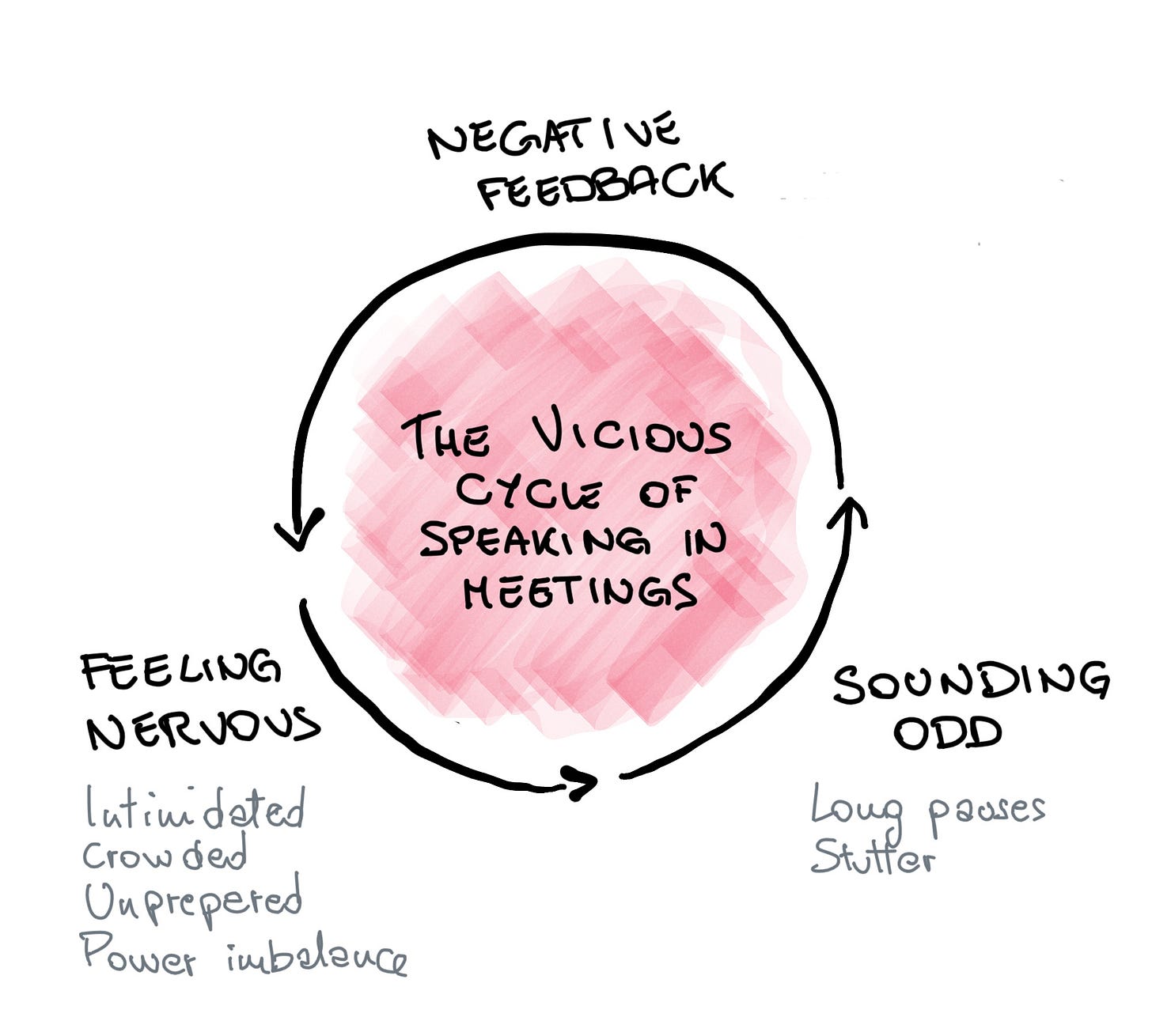'Let Me Think', or, How to Survive High-stakes Meetings
Curveballs, intimidating people, senior stakeholders, delicate situations. All those fun things that demand quick thinking, reading the room and adapting to the audience. Unless...
I've recently been reminded of how work life was before I figured out how to speak to stakeholders and senior people.
I mean, I chose this career in part because I thought I could sit behind a laptop and draw pretty things and only socialise with other computer nerds like me.
After years and years of faux passes, brain fogs, feeling like an alien and causing awkward silences (or accidentally promising the world when I was just trying to be nice), I finally figured out the formula from that rulebook that everybody received at birth except autistic people.
Repeat with me:
"I hear you,
I'm thinking X, but I'm not sure,
let me check and get back to you"
And then I go off and put my ducks in a row. I take my time to think, ask for more information, sanity check my thought process with colleagues, and come up with a well-structured answer, with a solid rationale and eloquent explanation.
I bet you think it’s a cheap trick, but no, it’s just the lowest common denominator of diplomacy.
Let me break it down.
What is actually important in high-stakes conversations?
What do people need to hear, really?
Think of applying UX research principles. Think of them as your customers. Why do they need an answer from you? Why now?
The most likely reason is that they have bosses, stakeholders, deadlines, and targets to reach, and your answer impacts that. They’re talking to you, but they’re not talking to you, they’re gathering the information they need in order to complete their own jobs and ease pressure on themselves. They need to feel confident that you’ve got this, you’re going to do your part to help them.
And you can do that for them, without having to uproot your life, by responding to their core needs and yours:
Let them know you are listening
Show them you understand their problem
Don’t commit to a solution, buy time to think
"I hear you,
I'm thinking X, but I'm not sure,
let me check and get back to you"
It’s a formula, but it’s not a trick.
Feeling the need to have a quick reaction and give the right answer puts us under pressure. It’s highly unlikely one can conjure the perfect response in their head 15 seconds after hearing the question. People try that all the time, and it may come across as confident, but they are usually full of sh*t.
When you think about it, we get paid for our expertise and our ability to explain it eloquently, which requires thought, so we should protect our time to think. It may frustrate some, but they’ll be glad for it when we come back with a solid concept.
“My gut tells me we’ll have to drop something else to make it in time, but let me think it through and see what’s possible”
“I have an idea, but I don’t know if it’s doable, let me check a few things first”
“I’m worried this won’t work, but I don’t have an alternative in mind, give me a day to work it out”
And then, for the love of all that’s holy, do get back to them, soon. Even if it’s to say you’re on it and need more time 😉
We all live in our own head
I always felt a barrier of understanding between me and most of the world's population. It’s how I eventually found out I am autistic.
I stockpiled a lot of negative feedback on my attempts at communication, ever since I was a kid (I have three much older siblings - although, at least they always explained in detail why I was weird 😑). It’s no surprise that I was nervous when talking to people, especially people in authority roles. I thought I was destined to not be understood.
I tried lots of strategies, like:
Not speaking until spoken to (“she’s shy / she never has an opinion”)
Saying everything I was thinking (“leave room for others!”)
Explaining things in interesting ways (“she’s funny but I don’t follow”)
Learning the personality of every person I worked with and trying to figure out what works best for each of them to tailor my storytelling (this one worked but it was just exhausting)
It got better, but not in a consistent or scalable way.
The mix of studying drama and becoming a manager finally flipped a switch in my head. First, I saw others be nervous when talking to me, which felt weird (and still does). Second, when I ask my team for something, I’m asking because I need it, not because I’m testing them and I’m going to judge them.
I used to think I was the alien, and I measured people’s reactions in conversations as if it was direct feedback to me, either on my idea or the way I delivered it.
As if we’re all back in school, and they’re the teachers, with the power to judge my character and predict if I’ll have a future.
Isn’t it ridiculous when you put it like that?
Tl;dr
Yes, talking to people in high-stakes situations is nerve-wracking. Stakeholders, seniors, clients, they have some level of power over you and your progression.
But remember this: we’re often more aware of their power than they care for it.
When push comes to shove, they just want to know they can trust you to do a good job. That’s something you can have empathy for.
The other thing to remember is that you can give them peace of mind without falling into people-pleasing, saying yes to everything or working nights. You have to come from a place of understanding and convey “Hey, I’m here to help, we’ll figure this out”.
"I hear you,
I'm thinking X, but I'm not sure,
let me check and get back to you"
When your brain fails, when you get a curveball thrown at you, when there are people on the call that make you nervous, when there are too many voices, you can always fall back to this.
Good luck, and let me know how it went!
What I’m up to
Taking it easy! Re-reading Atlas of the Heart: Mapping Meaningful Connection and the Language of Human Experience by Brené Brown, doing lots of puzzles and rewatching How I Met Your Mother 😁





